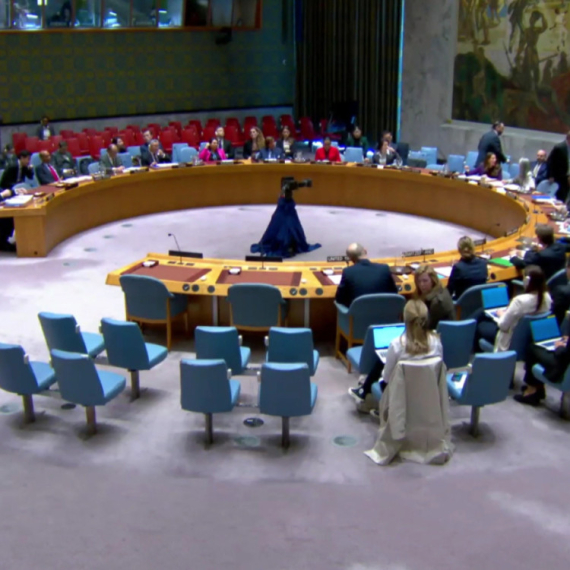Agrobanka's foreign investors look to new government
Agrobanka's foreign investors with head offices in the EU voiced their expectation that a new government would protect private property and investors in Serbia.
Tuesday, 03.07.2012.
09:24

Agrobanka's foreign investors with head offices in the EU voiced their expectation that a new government would protect private property and investors in Serbia. They expect this to happen in line with the European standards, a statement issued on Monday said. Agrobanka's foreign investors look to new government Expropriation of their holdings in Agrobanka – after the government revoked the work license to the bank in May and bankruptcy proceedings were launched in June – was not conducted in line with the economic criteria, but as a political decision, reads a release signed by the representative of the investors in Agrobanka, Ales Skoberne. It adds that this happened “without relaying on auditing control of operations of Agrobanka, whose majority shareholder is the state of Serbia itself." “Regardless of the fact that Serbia signed the program of financial rehabilitation of Agrobanka, after which the National Bank of Serbia (NBS) introduced the receivership into the bank, it has not taken part directly in either of the two extraordinary general meetings." "Thus, it has directly created conditions for further steps of expropriation of private property of other shareholders in Agrobanka,” the release also reads. Agrobanka - the timeline Agrobanka is a mid-sized bank listed on the Belgrade stock exchange, that expanded based on three share capital increases with a strong participation of foreign investors. In 2008 the Serbian state converted legacy international credit line into equity of the bank, thus gaining 20 percent ownership. 30 percent belongs to foreign investors, but because of dispersion the state has a controlling influence. In 2010, Slovenian AC Broker led a group of foreign investors which jointly hold 25 percent of shares in Agrobanka (East Capital Funds have around 5 percent). The group demanded changes of corporate governance in the bank by sending written letters to Republic of Serbia. In the wake of this, international investors managed to get one out of nine seats on the supervisory board of the bank In April 2011, auditor KPMG submited audited accounts for 2010, whereby equity of the bank stands at EUR 176mn. The National Bank of Serbia (NBS), on request of the Ministry of Finance, conducted a sanity check in the bank, subsequently estimating that the equity of the bank stood at EUR 6mn at the end of June 2011. In October 2011, the NBS toook "special measures" with which it blocked all reprogramming of loans but the ones which were classified as A; with this measure, it arguably put additional pressure on the quality of the loan portfolio. In late December 2011, the central bank dissolved current management and supervisory board and introduces interim management. A group of shareholders, in accordance to the law, initiates and designs the plan for bank’s rehabilitation. The plan was signed by more than 50 percent of shareholders, including Republic of Serbia, and approved by the NBS in February. In April, a group of foreign investors called the EGM, but it was not conducted because of lack of quorum, as the Republic of Serbia, a key shareholder, did not attend the meeting, effectively blocking a new audit of the books that is one of the key points on the agenda. The same moth, the interim management came up with a financial report that estimated the financial loss in 2011 at EUR 290mn and equity at -110mn. However, KPMG issued adverse opinion on the report. In May, another attempt at conducting an EGM failed for the same reason as the previous one, after which the NBS revokes the banking license of Agrobanka, and at the same time forms a “New Agrobanka” to which it intends to transfer assets and deposits of Agrobanka. According to minority shareholders, no additional details of the plan were presented, leaving them out of the process completely. B92 VIP
Agrobanka's foreign investors look to new government
Expropriation of their holdings in Agrobanka – after the government revoked the work license to the bank in May and bankruptcy proceedings were launched in June – was not conducted in line with the economic criteria, but as a political decision, reads a release signed by the representative of the investors in Agrobanka, Ales Skoberne.It adds that this happened “without relaying on auditing control of operations of Agrobanka, whose majority shareholder is the state of Serbia itself."
“Regardless of the fact that Serbia signed the program of financial rehabilitation of Agrobanka, after which the National Bank of Serbia (NBS) introduced the receivership into the bank, it has not taken part directly in either of the two extraordinary general meetings."
"Thus, it has directly created conditions for further steps of expropriation of private property of other shareholders in Agrobanka,” the release also reads.
Agrobanka - the timeline
Agrobanka is a mid-sized bank listed on the Belgrade stock exchange, that expanded based on three share capital increases with a strong participation of foreign investors. In 2008 the Serbian state converted legacy international credit line into equity of the bank, thus gaining 20 percent ownership.30 percent belongs to foreign investors, but because of dispersion the state has a controlling influence.
In 2010, Slovenian AC Broker led a group of foreign investors which jointly hold 25 percent of shares in Agrobanka (East Capital Funds have around 5 percent). The group demanded changes of corporate governance in the bank by sending written letters to Republic of Serbia.
In the wake of this, international investors managed to get one out of nine seats on the supervisory board of the bank
In April 2011, auditor KPMG submited audited accounts for 2010, whereby equity of the bank stands at EUR 176mn.
The National Bank of Serbia (NBS), on request of the Ministry of Finance, conducted a sanity check in the bank, subsequently estimating that the equity of the bank stood at EUR 6mn at the end of June 2011.
In October 2011, the NBS toook "special measures" with which it blocked all reprogramming of loans but the ones which were classified as A; with this measure, it arguably put additional pressure on the quality of the loan portfolio.
In late December 2011, the central bank dissolved current management and supervisory board and introduces interim management.
A group of shareholders, in accordance to the law, initiates and designs the plan for bank’s rehabilitation. The plan was signed by more than 50 percent of shareholders, including Republic of Serbia, and approved by the NBS in February.
In April, a group of foreign investors called the EGM, but it was not conducted because of lack of quorum, as the Republic of Serbia, a key shareholder, did not attend the meeting, effectively blocking a new audit of the books that is one of the key points on the agenda.
The same moth, the interim management came up with a financial report that estimated the financial loss in 2011 at EUR 290mn and equity at -110mn. However, KPMG issued adverse opinion on the report.
In May, another attempt at conducting an EGM failed for the same reason as the previous one, after which the NBS revokes the banking license of Agrobanka, and at the same time forms a “New Agrobanka” to which it intends to transfer assets and deposits of Agrobanka.
According to minority shareholders, no additional details of the plan were presented, leaving them out of the process completely.


























































Komentari 3
Pogledaj komentare